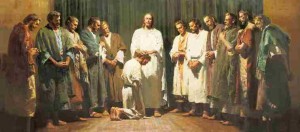In the Book of Mormon, a prophet declares, “Adam fell that men might be, and men are that they might have joy.” Indeed, the Plan of Salvation that our Father in Heaven has prepared for us is often referred to as the Plan of Happiness. We also learn that Nephi and his people “lived after the manner of happiness.” But what is happiness? What qualities are found therein?
In recent years I have been amazed at how consumerism continues to expand indefinitely. From iPhones to the food we eat, life is a never ending torrent of advertisements telling us that “it is okay, you deserve it.” As if to say that we are “entitled” to let go once in a while without consequences. Unfortunately, this has translated into us feeling that we should be able to “let go” whenever, wherever, and for how ever long we please.
Those who buy in to this subtle deceit are led to waste so much of their time, money, and other resources that they become trapped by consequences that are now out of their control. These consequences come, among other things, in the form of broken homes and marriages, poor health, debt, and perhaps the most fearsome, they become enslaved to the ever-powerful chains of sin. In my mind, it stems from the person not being able to forego the easy pleasures of today, for the hard-earned happiness of tomorrow. I see so many people whose whole goal in life seems to be focused on one thing and one thing only–pleasure and the more the merrier. They are so consumed with the newest fashions in clothing, or having that new car, or the latest technology in televisions or game stations, or what they are going to do Friday night, that when they wake up late Saturday morning, they have nothing but fading memories that only leaves them hungering for more. It is like eating Kix; you can eat 10 bowls at eight AM and by nine you are hungry again.
This has led me time and time again to contemplate on the difference between pleasure and happiness. What types of activities and pursuits do I have? Do they bring only pleasure, or will they bring lasting happiness. More often than not, happiness demands sacrifice and large amounts of it. Nevertheless, happiness is always sweeter and more desirable than pleasure. For me, happiness is akin to vine-ripe strawberries. One must water and weed, fertilize and wait, but there is nothing quite like that sweet taste at the end of June after two months of hard work. Here is a quote by James E. Talmage (a leader of our church at the turn of the 20th century) comparing pleasure and happiness. I hope that you will take the chance to reflect on what you spend your time pursuing and, if needed, change. You will never be sad you did when you eat the sweet fruit, fresh off the vine and hopefully you will never want to go back to that nasty, store-bought stuff.
“The present is an age of pleasure-seeking, and men are losing their sanity in the mad rush for sensations that do but excite and disappoint. In this day of counterfeits, adulterations, and base imitations, the devil is busier than he has ever been in the course of human history, in the manufacture of pleasures, both old and new; and these he offers for sale in most attractive fashion, falsely labeled, Happiness.
“. . . Happiness includes all that is really desirable and of true worth in pleasure, and much besides. Happiness is genuine gold, pleasure but gilded brass, which corrodes in the hand, and is soon converted into poisonous verdigris. Happiness is as the genuine diamond, which, rough or polished, shines with its own inimitable luster; pleasure is as the paste imitation that glows only when artificially embellished. Happiness is as the ruby, red as the heart’s blood, hard and enduring; pleasure, as stained glass, soft, brittle, and of but transitory beauty.
“Happiness is true food, wholesome, nutritious and sweet; it builds up the body and generates energy for action, physical, mental and spiritual; pleasure is but a deceiving stimulant which, like spiritous drink, makes one think he is strong when in reality enfeebled; makes him fancy he is well when in fact stricken with deadly malady.
“Happiness leaves no bad after-taste, it is followed by no depressing reaction; it calls for no repentance, brings no regret, entails no remorse; pleasure too often makes necessary repentance, contrition, and suffering; and, if indulged to the extreme, it brings degradation and destruction
“True happiness is lived over and over again in memory, always with a renewal of the original good; a moment of unholy pleasure may leave a barbed sting, which, like a thorn in the flesh, is an ever-present source of anguish. (James E. Talmage, Improvement Era, vol. 17, no. 2, pp. 172-73. Quoted in: Jesus the Christ: A Study of the Messiah and His Mission According to Holy Scriptures Both Ancient and Modern [Salt Lake City: Deseret Book Co., 1983], 230.)




